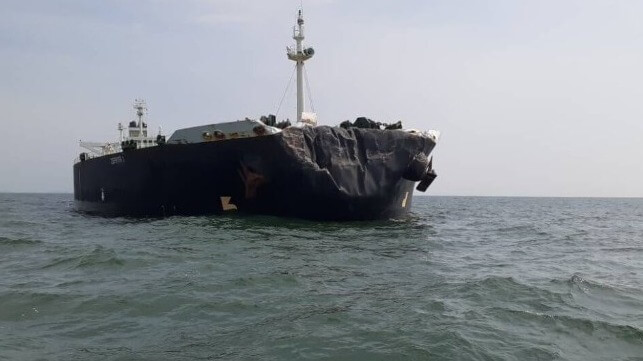U.S. Treasury Sanctions Tanker Owner for Trafficking Iranian Oil

The U.S. Treasury has blacklisted over a dozen companies, six people and 11 vessels connected to Iranian oil exports, which have been sanctioned by the United States since the U.S. withdrew from the Iranian nuclear agreement in 2018.
The individuals and shell companies banned on Tuesday allegeldy helped transport oil for the Islamic Revolutionary Guard Corps' Quds Force, a U.S.-designated terrorist organization and a division of Iran's military apparatus. The IRGC's agents use STS transfers, blending, AIS manipulation, shell companies, middlemen and other techniques to obscure the origins of its oil cargoes. The funds go to support the IRGC's paramilitary activities in the Middle East, including its support for the U.S.-designated terrorist organization Hezbollah.
“The individuals running this illicit network use a web of shell companies and fraudulent tactics including document falsification to obfuscate the origins of Iranian oil, sell it on the international market, and evade sanctions,” said Under Secretary of the Treasury for Terrorism and Financial Intelligence Brian E. Nelson. “Market participants should be vigilant of Hizballah and the IRGC-QF’s attempts to generate revenue from oil smuggling to enable their terrorist activities around the world.”
Four key players - Viktor Artemov, Edman Nafrieh, Rouzbeh Zahedi, and Mohamed El Zein - allegedly used dozens of front companies under their control to conduct the network’s activities. The network used oil storage at the Port of Sharjah in the UAE, and it blended Indian petroleum with Iranian oil to hide the product's real origin. The companies fabricated counterfeit certificates of origin and quality for the blended oil, which was then shipped onwards for sale in other nations, Treasury said.
Ukrianian national Viktor Sergiyovich Artemov is the main organizer of the alleged scheme, according to the Treasury. The agency believes that Artemov "oversees a vast, complex, and interwoven global network of front companies" used to arrange shipping for Iranian oil. His firms' activities span shipowning, ship management and oil trading, and he allegedly used his connections to buy and sell tankers for the Iranian oil trade. A small fleet of 10 vessels - the Julia A, Bueno, Bluefins, Boceanica, B Luminosa, Lara I, Adisa, Nolan, Zephyr I and Rain Drop - were all allegedly owned or managed by Artemov's companies.
The Zephyr I was last in the news in late September, when the mysterious vessel reportedly lost control of her heading and collided with a container ship off the coast of Malaysia. The ship has reportedly changed names and owners at least twice in 2022.
At least one additional vessel, the Djibouti-flagged Young Yong, allegedly carried oil for Artemov and one of his firms on a charter basis.

that matters most
Get the latest maritime news delivered to your inbox daily.
According to the Treasury, Artemov's Ava Petroleum was also engaged in the purchasing of Iranian oil, sourcing the crude from a firm run by Iranian national Edman Nafrieh. Nafrieh's Al Hakeel Al Aswad Oil Trading allegedly sold 400,000 barrels of crude to Ava Petroleum, and it planned to sell another two million barrels.
Mohamed El Zein, one of Artemov's associates and a member of Hezbollah, was allegedly involved in coordinating the sales. El Zein used forged invoices from shell companies to hide the origins of transactions, according to the Treasury. The partners allegedly coordinated with the Iranian regime with the assistance of Iranian national Rouzbeh Zahedi, who handled financial dealings with the IRGC and Hezbollah.
